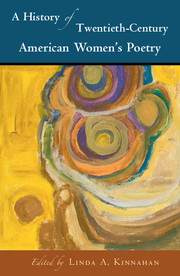Book contents
- Frontmatter
- Contents
- List of figures
- List of contributors
- Preface
- Acknowledgments
- PART I MAPPINGS AND CHRONOLOGIES
- PART II ETHNICITY, RACE, AND IDENTITY
- 5 Native American Women Poets
- 6 Asian American Women Poets
- 7 Chicana/Latina Women Poets
- 8 African American Women Poets
- 9 Jewish American Women Poets
- PART III MATERIAL FORMATIONS
- PART IV LINEAGES, TIES, AND CONNECTIONS
- PART V FORM, LANGUAGE, AND TEXT
- PART VI CODA
- Bibliography
- Index
5 - Native American Women Poets
from PART II - ETHNICITY, RACE, AND IDENTITY
Published online by Cambridge University Press: 05 June 2016
- Frontmatter
- Contents
- List of figures
- List of contributors
- Preface
- Acknowledgments
- PART I MAPPINGS AND CHRONOLOGIES
- PART II ETHNICITY, RACE, AND IDENTITY
- 5 Native American Women Poets
- 6 Asian American Women Poets
- 7 Chicana/Latina Women Poets
- 8 African American Women Poets
- 9 Jewish American Women Poets
- PART III MATERIAL FORMATIONS
- PART IV LINEAGES, TIES, AND CONNECTIONS
- PART V FORM, LANGUAGE, AND TEXT
- PART VI CODA
- Bibliography
- Index
Summary
While poetry has played a critical role in the development of Native American women's literature, it remains a relatively neglected area of study. Yet Native poetry by women offers a unique opportunity to explore what it means to be Indigenous and female in the United States, using a typically compressed literary form that derives, at least for Native communities, from the song and ceremonial traditions that have shaped tribal cultures for centuries. The desire of Western literary critics to limit and define the poetry of Native American women has, traditionally, resisted examining poetry as the natural extension of tribal song or acknowledging the ways in which Indigenous women produce poetry that defies conventional definitions of poetic form, turning poetry into a vehicle for self-reflection and redefinition. As Janice Gould (Maidu) explains, “[p]oetry often serves to tell us about the places we have been as a people or about the places we wish to be. What we admire about it, … [and] about the poets who make it, are the ways poetry may succinctly distill and render human experience into language.” The writing of poetry becomes a vehicle for Indigenous women to explore the particularities of their lives, offering a source of inspiration and motivation for readers to reflect on the challenges of what it means to be a Native woman in America; the poems reflect the complex struggles of Indigenous women as individuals who are multiply marginalized by their race, gender, tribal status (or lack thereof), place of residence (on or off the reservation), religious affiliation, and sexual orientation.
Of course, writing in English is itself tricky for Native women writers who may be unfamiliar with their Indigenous language but have a conflicted relationship with what Joy Harjo (Mvskoke) and Gloria Bird (Spokane) have famously called “the ‘enemy language.’” The introduction to their groundbreaking anthology of contemporary Native women's writings from across North America, Reinventing the Enemy's Language, offers a pointed reminder of the difficulties of writing. Yet the power of language is recognized as an important tool in Indigenous communities; it can “heal, … regenerate, and … create.” Native women's poetry exemplifies this strategic approach to the English language and to a genre that historically was perceived of as the domain of white, male authors.
- Type
- Chapter
- Information
- A History of Twentieth-Century American Women's Poetry , pp. 75 - 89Publisher: Cambridge University PressPrint publication year: 2016

